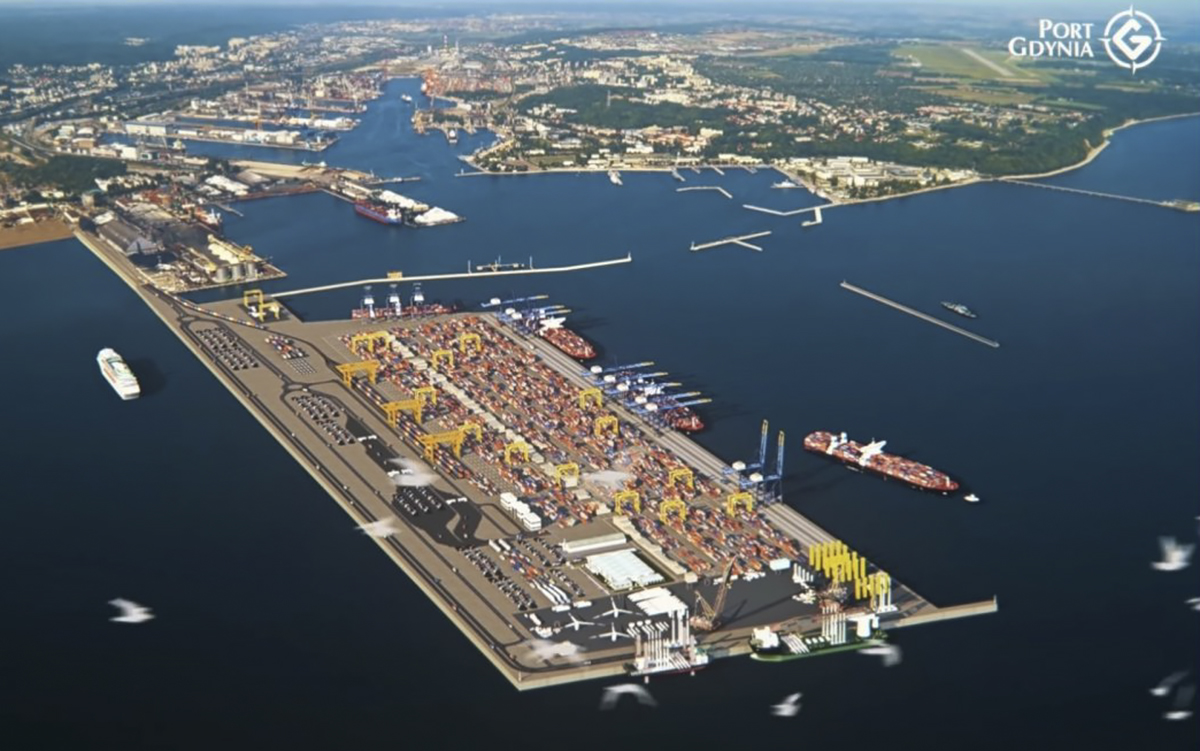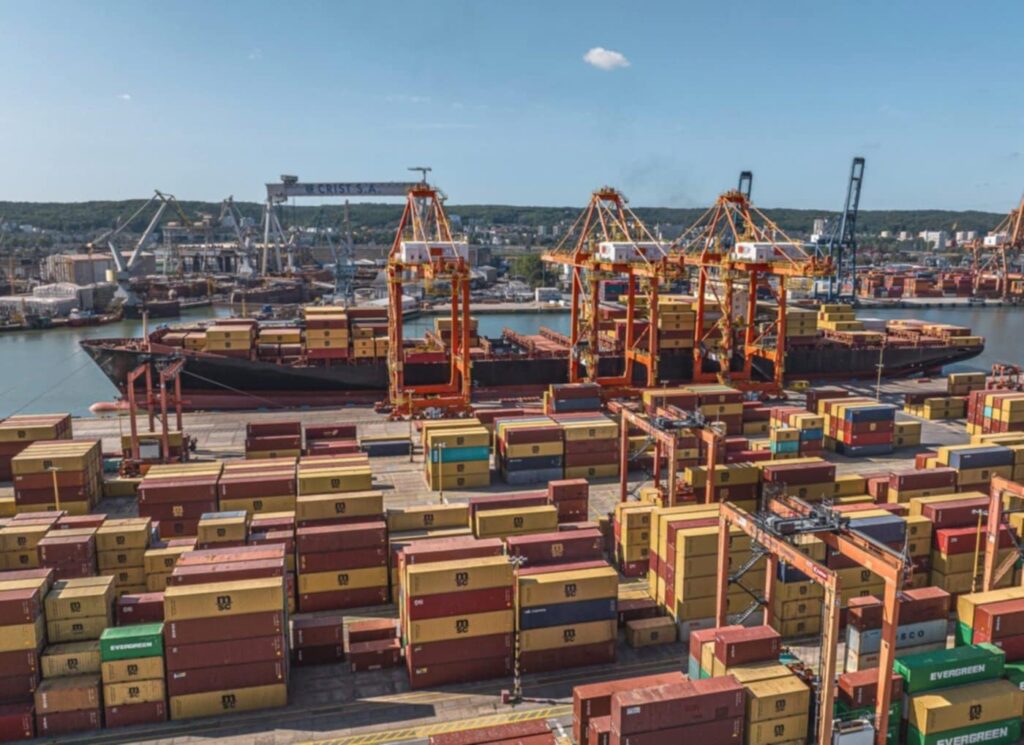By : Marek Grzybowski ( Poland )
The Parliamentary Infrastructure Committee held an away meeting in mid-July of this year. Representatives of the Port of Gdynia Authority, administration officials, and local governments met with Deputy Minister Jacek Karnowski, Deputy Minister Stanisław Bukowiec, Marshal Mieczysław Struk, Voivode Beata Rutkiewicz, Mayor of Gdynia Aleksandra Kosiorek, and representatives of the Ministry of National Defense.
The Red Road
The meeting began on a high note with a statement from Piotr Gorzeński, President of the Port of Gdynia Authority. “The Port of Gdynia Authority and companies operating in this area generate revenues exceeding PLN 8.5 billion annually for the state budget. Half of these funds are needed for the construction of the Red Road,” Gorzeński emphasized.
The investments of the Port of Gdynia
His statement was expanded upon by the Vice-President of the Port of Gdynia, Mirosław Czapiewski, who presented the potential of the Port of Gdynia, the investments completed to date, and the current progress in three key investments. He mentioned the Outer Port, the Red Road, and the Logistics Valley.

The Outer Port
The Outer Port is a project that the Gdynia Port Authority intends to implement in a public-private partnership. President Czapiewski stated that “the project encompasses over 150 hectares of landing area and 950 meters of quay, which will allow Gdynia to accommodate the largest container ships and provide a transshipment capacity of 2.5 million TEU per year.”
Project components
The Outer Port will consist of the creation of a new port pier in the form of an artificial peninsula. A container terminal is planned on it. The possibility of building other services, such as additional facilities for bunkering with alternative fuels, was also discussed. The Outer Port will be built on an extension of the Coal Pier, which operates in the area of the ferry terminal and the Emigration Museum. The quays of the Outer Port will be 17 meters deep.
Heading towards the sea
“For decades, the port has been developing within its existing boundaries. Because it is surrounded by the city, there are no significant development opportunities in this area, so today we are taking to the sea. This is the only direction that will ensure the expansion of the Port of Gdynia’s capabilities in the long term,” said Piotr Gorzeński, President of the Gdynia Seaport Authority, during an away session of the Parliamentary Infrastructure Committee.
The new quays
The new quays at the Port of Gdynia will enable the arrival of container ships over 400 meters in length and with a draft of up to 16 meters—the largest container ships accessible in the Baltic Sea. The size restrictions for vessels are due to the permissible drafts of vessels transiting the Danish Straits.
“The Outer Port will not only contribute to the development of the Port of Gdynia, but will also translate into increased budget revenues for Gdynia, Pomerania, and Poland, and will contribute to the creation of many new jobs in the Pomeranian region.” It will be a crucial element of the Trans-European Transport Network (TEN-T), emphasize representatives of the Port of Gdynia Authority.
A contract for the “Construction of protective breakwaters, constituting the water access infrastructure to the Outer Port in the Port of Gdynia, using the design and build formula,” was recently signed between the Maritime Office in Gdynia and the Port of Gdynia Authority.
The general contractor will be a group of companies led by Budimex S.A. Roverpol and Rover Maritime will collaborate on the construction of the breakwaters. The project involves the construction of the first phase of the Outer Port breakwaters. The entire project involves the construction of nearly 2.5 kilometers of new hydrotechnical installations.
The breakwaters
will be constructed on a structure composed of submerged reinforced concrete boxes. Each box will be approximately 50 m long, 13.6 m wide, and 14.5 to 16.5 m high. The boxes will be constructed on a floating dock using continuous concreting. The boxes will then be launched, and their concreting will take place on the water.
Design work
Budimex and its partners are currently conducting design work. After obtaining a building permit, construction work will begin, primarily on the water. The total value of the design and construction work has been estimated at over PLN 539 million gross. The work is expected to be completed in the second quarter of 2028.
Invitation of Investors

Vice President Mirosław Czapiewski emphasized that encouraging investors to participate in the construction of the outer port and invest in the Logistics Valley depends on good road connections, including the rapid construction of the Red Road.
The financing model needed
Advisor to the Minister of National Defense, Maciej Samsonowicz, emphasized that from the Ministry of National Defense’s perspective, the Red Road is of strategic importance. He argued that the financing model needed must be decided soon. The decision on how to finance the first stage will not affect the commencement of road construction in 2026.

Red Road on the list of tasks of strategic
“We will include the Red Road on the list of tasks of strategic importance for the country. If the regulations on strategic investments come into force, we can shorten the procedures for obtaining environmental decisions.
These procedures could be shortened by approximately two years,” he noted. He also stated that the PLN 2 billion guaranteed by law for the construction of the Red Road is insufficient for the entire investment.
The Red Road financing concept
There is a possibility of financing from the defense fund, as the entire project is expected to cost approximately PLN 4.5 billion. Construction documentation for the Red Road should be prepared by the end of 2025.
The Red Road is to begin near the public ferry terminal. It will connect Gdynia’s transshipment terminals with the national road system, including the S6 expressway. The road will be approximately 9 kilometers long from the ferry terminal to the expressway.
Three stages of road construction
The road will be built in three stages. The first stage of construction of the Red Road, from the Chylonia junction to the Kwiatkowskiego junction, is scheduled for completion by 2030, representatives of the Ministry of Infrastructure assured during a meeting of the Parliamentary Infrastructure Committee at the Port of Gdynia.
Related : Port of Gdansk. Baltic Hub. T3 Terminal 1.5 thousand TEU is open





